Interview with Tiny Roar - XEL
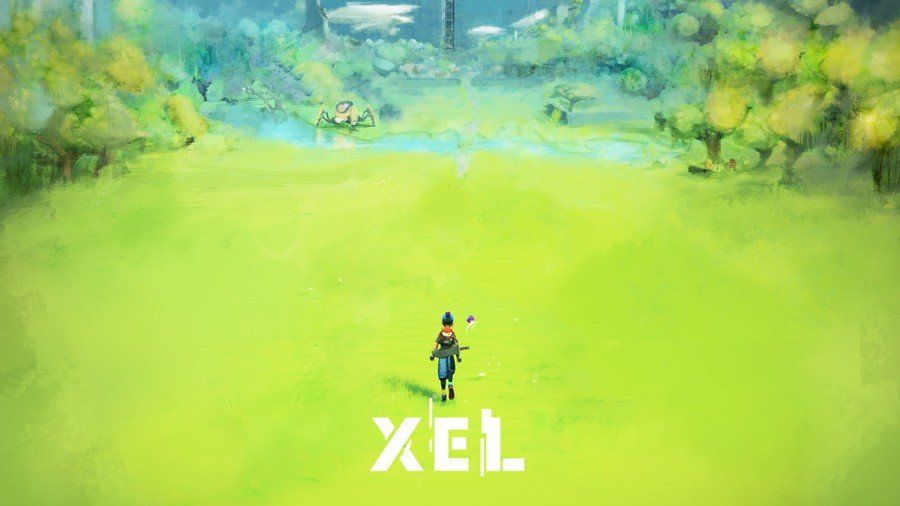
In leadup to the launch of Tiny Roar's 3D action-adventure game XEL on Nintendo Switch (and other platforms) next month, Bruno spoke with Creative Director Maurice Alain to ask a few questions:
Bruno: In your own words, please tell us a bit about XEL.
Maurice: In XEL, you play as Reid, an amnesiac traveler stranded on a strange planet where she must figure out who she is and what happened to the desolate world on which she’s crash-landed. You’ll lead Reid on her journey as she explores, fights, and solves puzzles through three challenging dungeons and an overworld that has more than a few tricky secrets spread throughout.
To be outright, I am a huge fan of action-adventure titles like Zelda, where XEL draws a lot of its inspirations. This project is the biggest and most fulfilling challenge our studio has undertaken yet. We establish Tiny Roar seven years ago with a small group of three developers, and now we boast over ten wonderful team members. We’ve all been working on this game for over a year and it’s really an amalgamation of our excitement for the genre and our passion to tell stories that connect with the players.
B: The game’s name is its world. Can you please tell us a bit about the world and what we can expect to find?
M: I can’t give away too much about the game’s premise, as it really must be experienced to get the full picture, but I can tell you a little bit about our creative process as we built out the world that would become XEL:
We set out wanting to create a story that would appeal to fans of fantasy titles like Zelda, but also have our sci-fi roots shine through in every part of it. We also felt that the Zelda inspirations throughout the game, especially in the beginning, would make it more approachable to players who may not be familiar with or strictly enjoy sci-fi as a genre. But the further you dive into XEL, you’ll find that as you weave through the game’s mystery, you’ll discover completely different settings, such as dungeons inspired by ice, fire, and even a horror-themed dungeon! We wanted to include a little something for everyone with a lot of variety.
B: What about the main character? What can you tell us about her?
M: Reid was designed to be like an antithesis to Link; more like a counter-character, if you will. They share this unique androgyny, but Reid is not mute. Our goal wasn’t necessarily to create an “empty” character, but rather a character where you can see yourself in her, and someone that you can become really immersed in. We designed Reid to be the people’s protagonist and left her individualism totally ambiguous. She is not gendered, nor does she claim specific sexuality. The player can decide that if they want to. Nothing about Reid is binary.
Reference: Reid Character Design: https://steamcommunity.com/games/1674640/announcements/detail/5167312537217504248
B: As the creators and without any spoilers, are you particularly excited for the players to experience any particular part of the game? Anything players should keep an eye out for?
M: From my perspective, it’s difficult to be excited about just any one thing. From the art to the hidden fighting techniques and the crafting intricacies, there’s so much to discover and fall in love with. I really do hope our players are able to unlock the many voice lines and reactions from Reid—those are really fun. We were able to partner with some pretty great voice actors for the game, which really enriched the whole experience and we know that will be a high enjoyment factor in the game. The game’s script is VO in both English and German, which means that the game could feel a little different depending on which language you are playing in, but in the best way possible. As a writer, I don’t think there has to be one definitive version of a character, especially if you consider that their culture could influence their personality and actions.
For example, the “German Reid” is a little rougher around the edges and pulls no punches. The English voice actor is the same actress who voiced Scarlet Witch and the performance comes off much softer and more sentimental. It’s still pretty crazy to me how such small nuances can make a big impact.
B: Who is XEL for? Is it targeting those that love story over everything else, gamers that are looking for solid gameplay, or maybe exploration nuts?
M: XEL is supposed to be welcoming to everyone, and anyone can enjoy it whether they are huge sci-fi fans or have never even heard of Zelda. There’s plenty of other video game and pop-culture stuff that we poke fun at. There’s a reference for everyone. When we get asked how big the game is from a size reference, I often consider it relative to Link’s Awakening moreso than Breath of the Wild. XEL offers a proper variety of everything you’d expect like exploration, dynamic combat, crafting, and more all tied together with a really engaging story.
B: What part of creating XEL took the most effort?
M: The world design and dungeon creation took the most effort, by far. I think so many developers think of the creation process like, “There’s so much reference material, there’s no way to fuck this up,” but in reality, there’s a lot to fuck up and you will, plenty. This is our first action-adventure game and even though we pushed ourselves well outside of our collective comfort zone, creating a good dungeon crawler takes so much more than watching lots of Game Maker’s Toolkit videos (although, shoutout to Mark Brown because we wouldn’t be here without him!) It takes time to get a dungeon to feel and play right, especially as an indie studio with a limited budget. It seems like every week you wind up spending on something outside of the planned schedule, which means something else has to be sacrificed. (Sorry ‘Fishing Mini-Game” but ‘Dungeon 1” really needed the extra work).
B: Where does XEL stand compared to the other games you have worked on? Could you say it’s an improvement on something you’ve done in the past, or is it an entirely new experience?
M: Maybe this is an unsatisfying answer, but actually both. As a studio, we worked on so many things like shooters, arcade multiplayer games, and I personally even worked on a kart racing game at one point. One thing that many indie devs accept is that you are always working on a sequel of things. Every new game feels like you need to learn to speak a new language over again, but the truth is, we all play and analyze so many great games all the time. We’re constantly trying to figure out what makes them great and shed some of that influence on our own projects where it makes sense. Making something awesome takes time and many, many tries. In that sense, we hope to improve on XEL in the future by making another action-adventure game as a studio.
B: This certainly looks like your most ambitious title yet. How long did it take to make?
M: We worked on the XEL prototype for six months before we pitched the concept to publishers. When we found one (shoutout to Assemble Entertainment!), we started from scratch with the lessons learned from the prototype stage. We had 14 months to create XEL as we know it today.
B: Is there a particular message/moral behind XEL?
M: Though many will disagree, all creative work is political. As a result, of course, the game will reflect some of the things our team members have on their minds, like corporate greed, the climate crisis, and fascist movements on the rise. With the pandemic, tensions rose in everyone’s household and social circle. With XEL, and any video game, we want to create an escape from that turmoil without bombing you with even more horror or a “mirror” to the real world. But similar to Superman’s origin story, XEL is inspired by real-life events, but it will give you some hope.
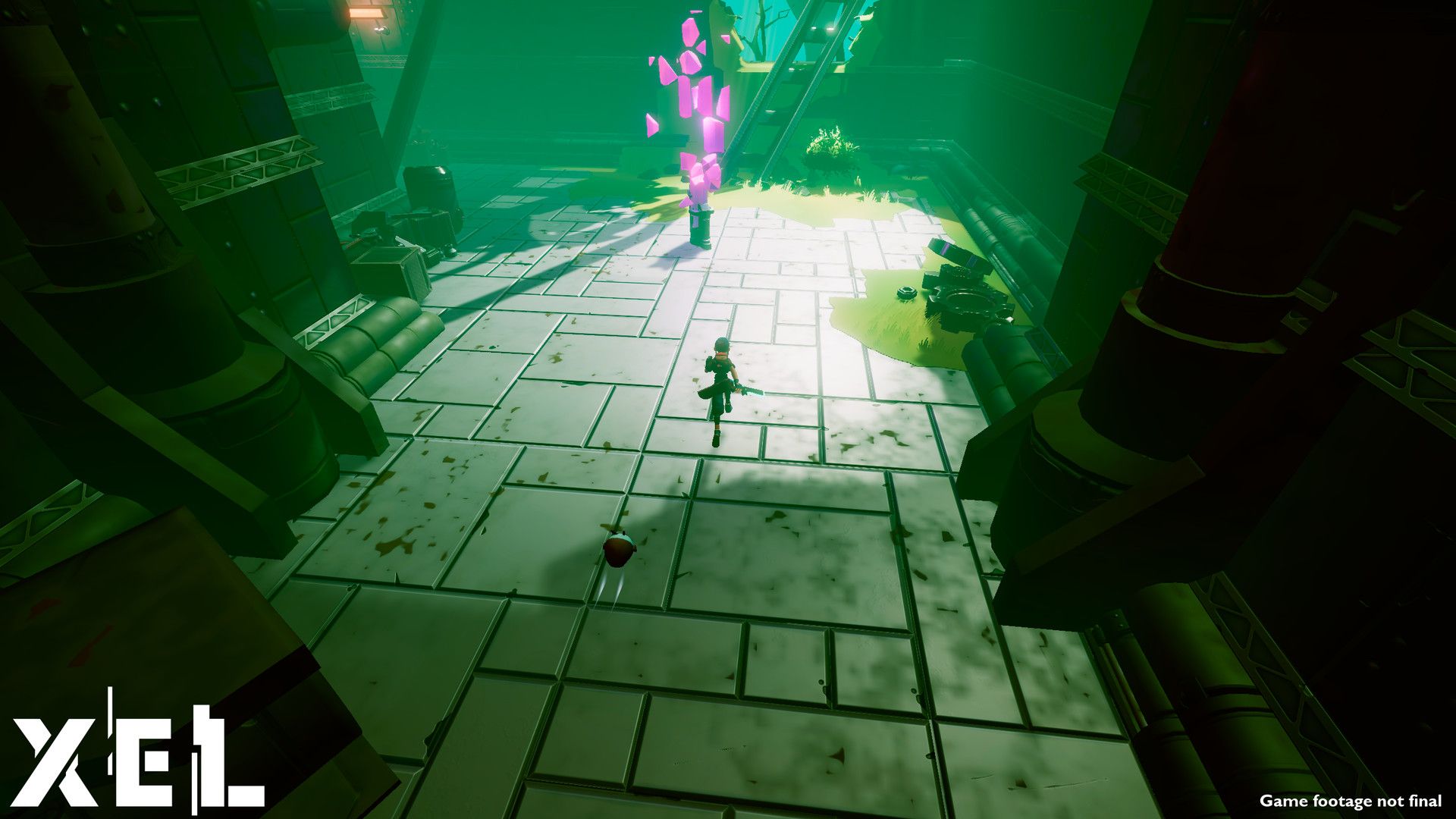
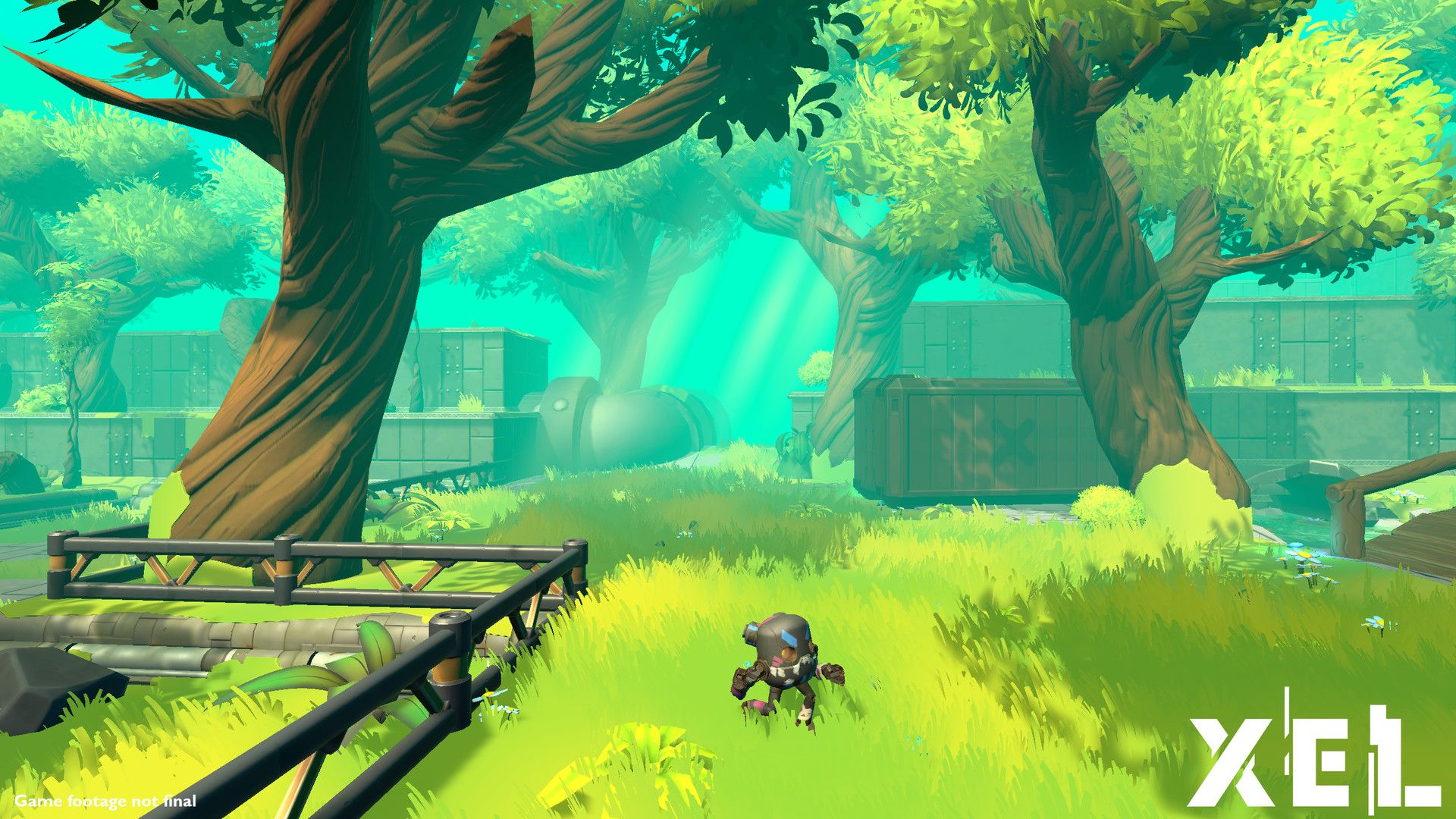
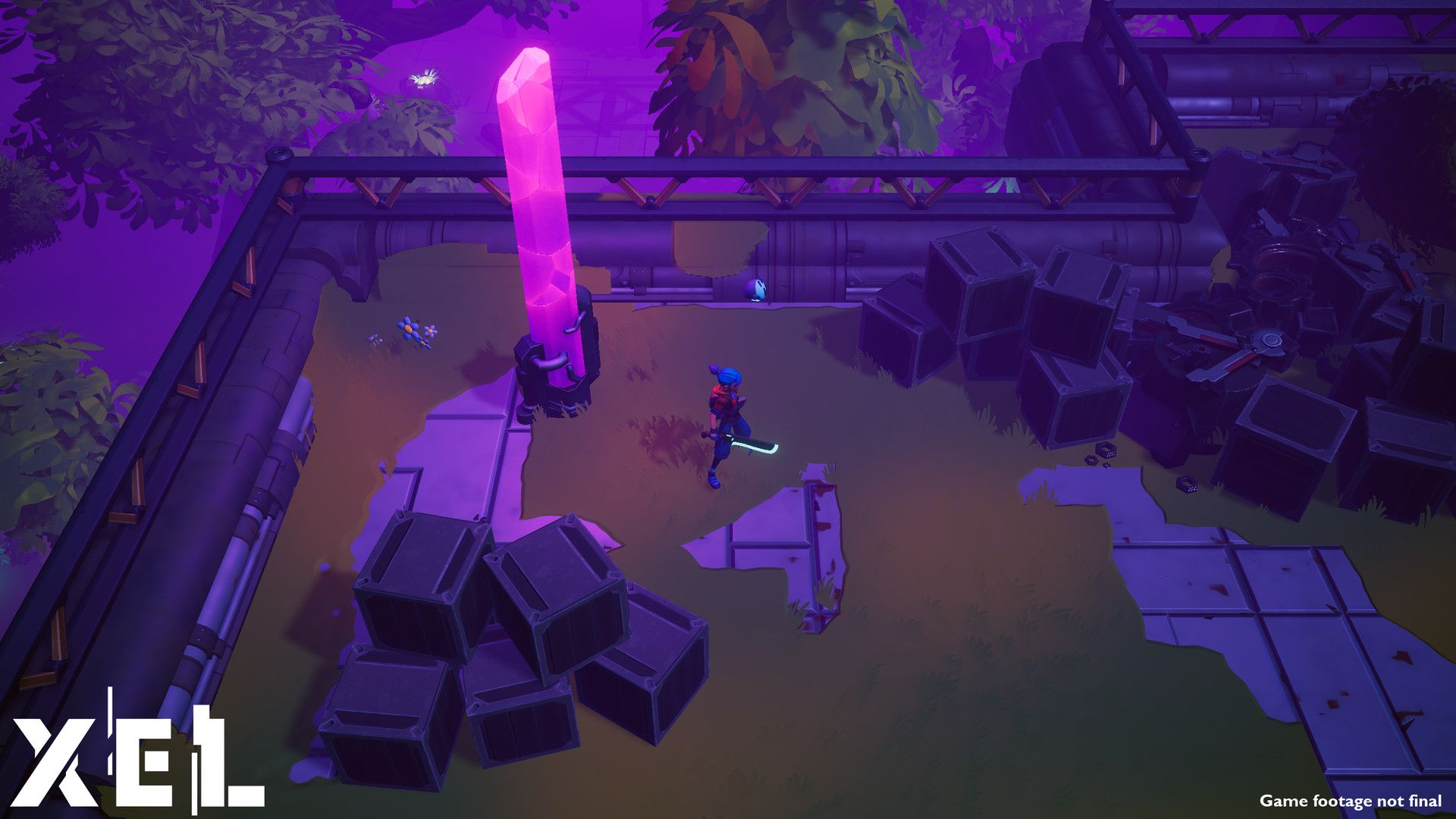
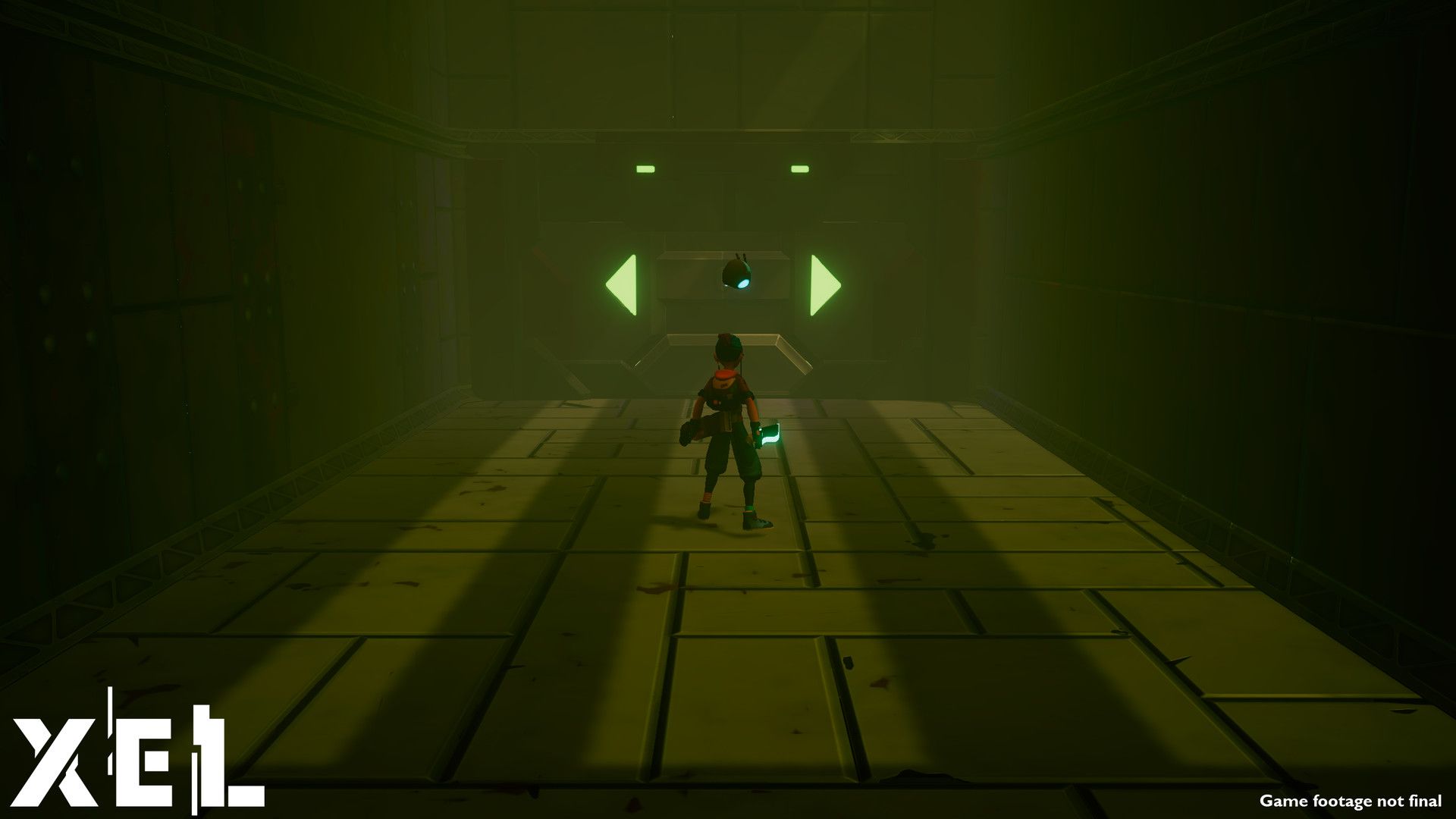
B: What are you hoping the players will take from the experience?
M: Shoot, I kinda answered that question in the last one. But in general, we hope that you can see how much love we put into this game and that it inspires you. Inspires you to write that book you always wanted to write, to call your grandparents, or to hug a friend. Everyone in our team had this one defining game experience in their life, that inspired them to make games. For me, the initial seed was the first time experiencing Super Mario Bros on the NES. Then, it was nurtured by that Christmas when I first played Ocarina of Time. Games can touch people, and that’s why we make games as a studio. To spark something in people. Even if it is just a short spark of joy after a long day of work.
B: Did you have any outstanding inspirations when creating the world and characters of XEL?
M: A big inspiration is Zelda—its worlds, characters, and everything that made it so joyous. But, also a little bit of all of the other media our team consumes. Rob, my co-founder, and I, bonded in high school over Phantasy Star Online on the Dreamcast. So some visuals and the soundtrack were, of course, influenced by our love for that universe.
B: What are your thoughts about releasing XEL to such a broad, globalized audience and reaching people all over the world?
M: If you look at cinema, but also Mangas, the markets or audiences are not that completely different anymore. We all share the same fears, laugh about the same silly stuff, and admire the same character traits in our heroes. I just despise how, for example, western movie studios always think they need to ground Asian IPs more, like that Dragonball Evolution movie, or even the Sonic movies (which turned out way better than I expected). People love new and stupid ideas if they are executed well. So, while I think we all share a lot of things, these things don’t need to be watered down in order to be digestible. We didn’t compromise in telling our story in XEL or when it comes to the visuals. The game looks and sounds how we, as a team with people with plenty of different cultural roots, think it should look and feel. We’re really eager for the feedback on that decision.
B: When can we expect to play XEL on Nintendo Switch?
M: I am answering this interview as I am waiting for the submission build for the Nintendo Switch, so I would say very soon.
B: Is there anything else you’d like to tell our readers?
M: Be kind. To everyone. We grew up with people like Angry Video Game Nerd, who finally pointed out the bullshit in games, but it turned into a phenomenon where that type of criticism turned into outright negativity toward pop culture in general and it’s now thriving as its own content genre. Instead, we should just let people enjoy things without shame. I, myself, fall into that same negativity trap at time. Heck, even my Twitter is the home to many a rant about superheroes. But, before you post something, try to think about the person on the other end of the screen and how their struggles are affecting their output. Only a handful of people really want to rip you off. The world is often better than we perceive it, despite the horrible things that do happen and shake us.
When it comes to XEL, I hope you have a great time and if you like the game, drop us a comment or a nice review. Heck, even recommend it to your friends. You will not believe how important those small acts of kindness are to us devs.
B: And lastly, where can our readers go to learn more about XEL and keep up with it in its leadup to launch?
We regularly post on our Twitter @tinyroargames and its official steam page blog. I’ll share the links below:.
Devlog #1 Reid Character Design: https://steamcommunity.com/games/1674640/announcements/detail/5167312537217504248 -> Könnte man auch bei Frage 3 darauf hinweisen.
Devlog #1 6 Pillars of Gameplay: https://steamcommunity.com/games/1674640/announcements/detail/3119301148804752100
Devlog #3 Gadgets, Concepts, Inspirations: https://steamcommunity.com/games/1674640/announcements/detail/3191370791151511943/
Dev Commentary: https://steamcommunity.com/games/1674640/announcements/detail/3117049982315558021
Thanks for the interview. See you soon in XEL!
